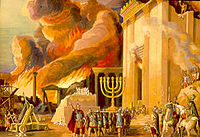Tisha BeAv
From Halachipedia
This article is specifically about the fast of the ninth of Av. To learn about any of the other fast days click here.
On Tisha B’av five tragedies occurred to the Jewish nation: 1. The Jews of the desert were told that they would not enter Eretz Yisrael following the sin of the spies. 2-3. Both Batei Hamikdosh were destroyed. 4. Beitar, a city filled with over 100, 000 Jews was captured and destroyed by the Romans during the Bar Kochva rebellion. 5. Turnus Rufus surrounded the heichal. [1]
Learning on Erev Tisha BeAv
What one may learn on Tisha BeAv
- One should not learn Torah on Tisha BeAv whether it’s Tanach, Midrash, Mishna, Gemara, Halacha, or Aggadata because Torah brings happiness to a person. [4]
- However, it is permissible to read Iyov, an explanation of Iyov, the sad parts of Yirmiyahu (prophesy about destruction and rebuke but not consolation or about destruction of the other nations), Midrash Eicha, an explanation of Eicha, the Gemara in the third perek of Moed Katan (which deals with the laws of mourning, excluding the happy parts), [5] the Gemara in Gittin and Sanhedrin which deal with the destruction of the Bet HaMikdash. [6]
- When learning the laws of mourning one may not go into the depth of halacha (with questions and answers). [7]
- Even in the areas one is permitted to learn one should not learn in a deep analytical way. [8]
- One may not even think of how to answer a serious difficulty in learning because one will feel satisfied when the matter is settled. [9]
Mourning practices on the tenth of Av
Fasting
- It is forbidden for all men of bar mitzvah age and women of at mitzvah age to partake in eating or drinking on the Tisha BeAv. The fast begins at shkiat hachamah of the 8th of Av and ends at Tzet Hakochavim of the 9th of Av. [12]
- It is forbidden for one to rinse out his/her mouth on Tisha BeAv; although, if one must they may rinse out their mouth with less than a Reviit of water. [13]
References
- ↑ Mishna Taanit 26b, Rambam Hilchot Taaniyot 5:3, Chayei Adam 133:5, Kitzur Shulchan Aruch 121:5, Mishna Berura 549:2
- ↑ Rama 553:2, Mishna Brurah 553:8
- ↑ Chazon Ovadyah (Arba Taniyot pg 248)
- ↑ S”A 554:1-2
- ↑ S”A 554:1-2, Mishna Brurah 554:2
- ↑ Mishna Brurah 554:3
- ↑ Mishna Brurah 554:4
- ↑ Mishna Brurah 554:4
- ↑ Mishna Brurah 554:4
- ↑ Rama 558:1, Mishna Brurah 558:3
- ↑ S"A 558:1, Kaf HaChaim 558:10
- ↑ Halachot and History of The Three Weeks, The Akkad Edition, Congregation Shaare Rahamim Halachot Series
- ↑ Halachot and History of The Three Weeks, The Akkad Edition, Congregation Shaare Rahamim Halachot Series
